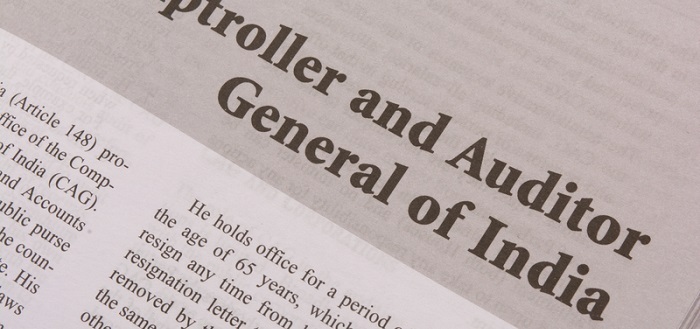
 Data Structure
Data Structure Networking
Networking RDBMS
RDBMS Operating System
Operating System Java
Java MS Excel
MS Excel iOS
iOS HTML
HTML CSS
CSS Android
Android Python
Python C Programming
C Programming C++
C++ C#
C# MongoDB
MongoDB MySQL
MySQL Javascript
Javascript PHP
PHP
- Selected Reading
- UPSC IAS Exams Notes
- Developer's Best Practices
- Questions and Answers
- Effective Resume Writing
- HR Interview Questions
- Computer Glossary
- Who is Who
What is the full form of CAG ?
What is CAG?
The top authority in charge of conducting external and internal audits of government expenditure is the Comptroller and Auditor General of India. It is frequently referred to as India's CAG. According to the Constitution, only the Comptroller and Auditor General are authorised to audit the Union's and the States' financial records.

The Comptroller and Auditor General of India is a position that is independent according to Article 148 of the Indian Constitution (CAG). He is one of the pillars of India's democratic system of government and the head of the Indian Audit and Accounts Department. He controls the nation's whole financial system at both the federal and state levels as the protector of the public purse. In the area of financial administration, it is his responsibility to maintain the Indian Constitution and parliamentary laws.
The Comptroller and Auditor General are in charge of checking the money that comes in and goes out of the federal government, the states, and the union territories. Each year, the CAG presents a number of audit reports to the state legislatures and the Parliament of the union territory. In accordance with the laws established by the legislature and the rules made thereunder, the CAG is also charged with auditing government entities, corporations, bodies, and authorities.
Office of CAG: Structure
The President of India appoints India's Comptroller and Auditor-General. By investigating and documenting how the government functions, this official is tasked with improving accountability. The CAG of India is mentioned under articles 148 to 151 of the constitution.

The department of audit and accounts is led by India's Comptroller and Auditor General.
As a representation of parliament, the CAG of India's principal responsibility is to act as an agent and oversee the expenditure audits. Finding and verifying the overall tax proceeds is the CAG of India's main authority. The CAG functions both at the state and national levels.
Roles and Duties of the CAG
In addition to the Public Account and Contingency Fund of India, he also audits the Public Account and Contingency Fund of each individual state.
He audits the accounts for all expenditures from the Consolidated Fund of India, the Consolidated Fund of each state, and the Consolidated Fund of the UT with a legislative assembly.
When needed by relevant laws, he audits all the receipts and expenditures of the authorities and bodies heavily funded by Central or State revenues, as well as those of government firms, other businesses, and bodies.
He audits every department of the Central Government and State Governments' commerce, manufacturing, profit and loss, balance sheet, and distinct subsidiary accounts.
Function of CAG
To send audit reports of the center's financial records to the president.
To send audit reports of the state's financial records to the governor.
To conduct an audit of the financial records related to the consolidated fund of India and the consolidated funds of each state and union territory's expenditures.
To Conduct an audit of the accounts pertaining to payments made from the contingency fund and the national and state public accounts of India.
To audit, any department of the federal or state governments' balance sheets, trade, manufacturing, profit-and-loss statements, or other financial records.
To audit the income and expenses of businesses owned by the government and other entities paid for with central or state funds.
Prominent Audit Reports
Folder scam
The district treasuries of Ranchi, Chaibasa, Dumka, Gumla, and Jamshedpur in Jharkhand and Banka in Bihar were involved in the Fodder Scam (Chara Ghotala), a corruption scheme. The estimated value of the fodder scandal was Rs. 950 crore (in rough value through dollar conversion, it would be about Rs 2,255 crore today).
2G Spectrum allocation
A Raja, Kanimozhi, and 15 other DMK politicians who were accused of participating in the 2G spectrum allocation scam case were cleared by a special CBI court in December 2017.
Coal mine allocation
To re-allocate the 204 coal blocks that the Hon. The Supreme Court of India revoked the Central Government issued the Coal Mines (Special Provision) Act, 2015. The Act allowed for the commercial sale of coal mines to private entities.
Conclusion
In this article, we've discussed the CAG's significance as one of India's key constitutional bodies. It is seen as a permanent body that the Constitution's forefathers added. The crucial point to keep in mind is that the CAG of India only serves as an "Auditor General," never as the "Comptroller." The country's president is reported to get the CAG reports, which are allegedly laid out in the parliament. The PAC (the Public Accounts Committee), which oversees the reports, is believed to receive assistance from the CAG in order to comprehend the technical reports.
FAQs
Q1. Who served as India's first comptroller and auditor general?
Ans. India's first comptroller and auditor general was Shri V.Narahari Rao.
Q2. Does CAG audit RBI?
Ans. The Reserve Bank of India is not audited by CAG in India. Although CAG does not undertake performance audits, it does audit other financial sectors authorities like SEBI, IRDA, and PFRDA.
Q3. Who is India's current Comptroller and Auditor General?
Ans. G. C. Murmu, a former governor of the Union Territory of Jammu & Kashmir, currently serves as India's comptroller and auditor general (CAG). On August 8, 2020, he was inaugurated. He is India's 14th CAG.

